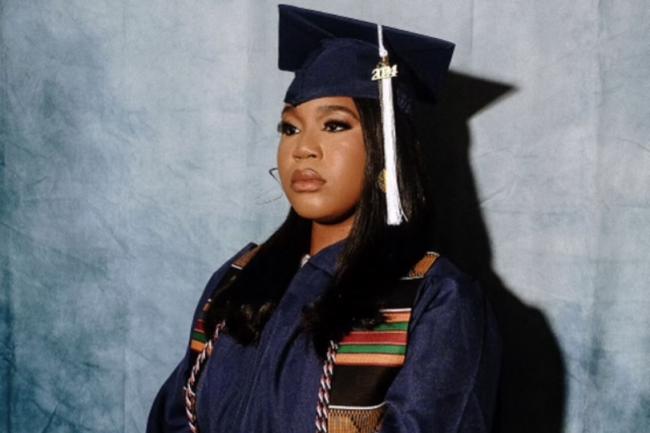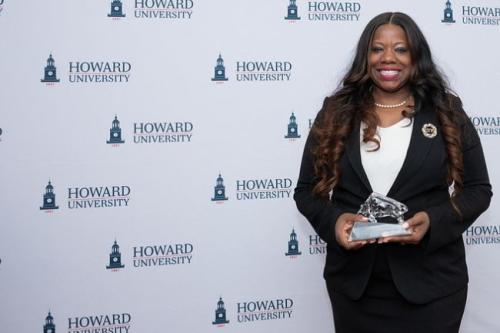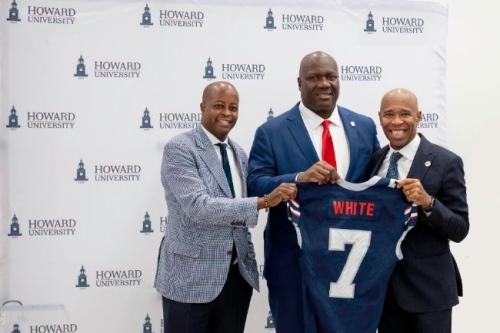Graduating senior Synia Taitt’s Howard University experience has been one of inspiration and success. Taitt identifies Howard as the reason for much of her academic and career success thus far.
“My Howard success was my community, who really taught me who I was, which I genuinely don’t think I would’ve achieved anywhere else. This community of people who brought me in and took their time to help craft me into the woman, scholar, and person I am is the biggest mark Howard has left on my life,” said Taitt. “I don't know who I would be without them, and I don't know who I would be without Howard. I am glad to say that I am graduating and going to an Ivy League university where my Howard legacy will never leave me. I will continue to do everything that Howard taught me, and I will continue to excel in truth and service. Howard taught me to be true to myself and I have excelled because of Howard.”
Taitt, a political science major and women, gender, and sexuality studies minor from Manhattan, New York, first enrolled at a liberal arts college in New Jersey after not being accepted to Howard out of high school, spending her first two years in college working toward transfer eligibility. She went into the experience with the determination to make it to Howard by any means necessary. She maintained a 3.7 grade point average, worked for the college’s first Black president, interned with Sen. Cory Booker, and helped establish the college’s first Black Caucus, serving as the inaugural president.
While her success began there, upon her arrival at Howard, Taitt flourished. During her Howard career, she completed four conference presentations for her work titled, “Trust Issues: Race, Trust and Police Legitimacy.” In completion of her programs, Taitt produced an honors level thesis on how the Black Lives Matter movement impacted Black political thought and attitudes towards institutions, specifically ideals about policing and the institution of police. She was consistently encouraged by her mentors that the work she was doing was not only important, but crucial.
“That was the start of me realizing that Howard was shaping who I am and genuinely giving me confidence in my identity and my work,” Taitt said.
Taitt credits Keesha Middlemass, Ph.D., and Marcus Board, Jr., Ph.D., with helping her navigate Howard and her career. Her success story, she said, started in Middlemass’ race and public policy course, the first course she attended on Howard’s campus. Taitt felt an instant connection and sense of comfort in Middlemass’ class and became part of a community of students who met weekly with Middlemass for academic discussion and enrichment. Middlemass quickly became Taitt’s mentor and academic advisor, helping secure internships, complete research, and prepare Taitt for her post-graduate career.
“Dr. Middlemass is a person who loves to mentor people from the ground up,” said Taitt. “She will invest in students’ success, always being a cheerleader and giving whatever she can along the way. I’m proud to say that I am the woman that I am, in part, due to her mentorship.”
Last summer, Taitt’s two mentors encouraged her to pursue fellowships with political science summer institutes: one at the University of California, Los Angeles (UCLA), for which Board serves as an HBCU liaison; and the American Political Science Association’s Ralph Bunche Summer Institute at Duke University. She was accepted to both and spent her entire summer learning and researching in the field of race and ethnic politics. At the Bunche Institute, Taitt was one of only 14 student scholars accepted from a competitive applicant pool.
In the fall of her senior semester, Taitt’s grandmother unfortunately passed away from cancer. Despite the tragedy, Taitt has remained a hard worker. This year, she was appointed chief policy advisor for the Howard University Student Association; interned for Students for Voting Justice, a nonprofit voter education organization; and served as a fellow for the Justice Division in the American Civil Liberties Union (ACLU)’s national office, where she worked on the Death Penalty Project. Simultaneously, Taitt started her Ph.D. application cycle.
“The many things I was involved in were very demanding, but upholding my grandmother's legacy was at the forefront of my year,” Taitt said. “She took pride in having me as her granddaughter and always inspired me to be the best I can be. I do it all for her legacy now.”
After graduation, Taitt will pursue a doctorate in political science at Cornell University. She was accepted to graduate programs at UCLA, University of Maryland, and New York University, but chose Cornell as it is the Ivy League institution with the highest proportion of Black undergraduate and graduate students with community and academic scholars who align with her path. Her graduate research will focus on Black political attitudes towards institutions, specifically policing, and she will continue a line of political thought that utilizes Dr. Michael C. Dawson’s concept of Linked Fate.
“I saw … there was not enough research on Black people within America – more specifically, the reasons for distrust in police. I took this and said this is how I will contribute to my people and hopefully contribute to policy that ends the police violence and brutality,” said Taitt.
“The successes I have experienced would never have been possible without the people who stood beside me. I think that what success at Howard University means is community. Howard is unique in the fact that we look out for each other and genuinely care about Black success. And that's something I’ve never experienced anywhere else.”
###





